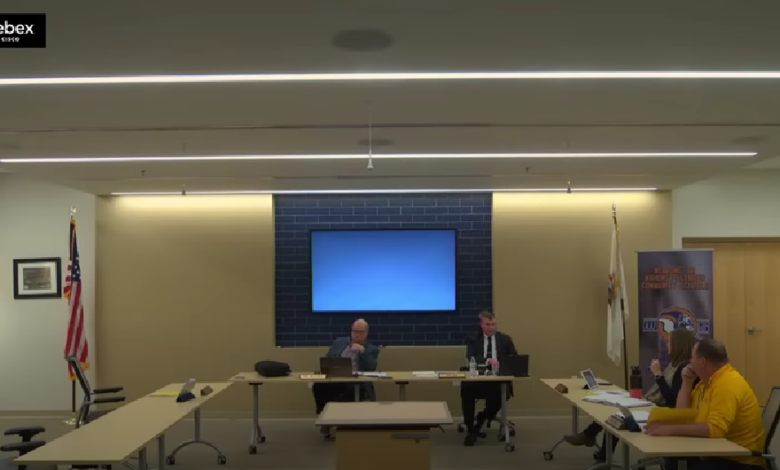Mahomet-Seymour School Board becomes a 5-member board for meeting on Jan. 17

By Dani Tietz
It’s become commonplace at Mahomet-Seymour School Board meetings: “Illinois School Code.”
It’s the compilation of laws and regulations that guide what school boards and school districts across the state can and cannot do, whether it’s in electing board members, governance, policy, or procedure. It provides protection for taxpayers, electors, and students alike.
Few spend time reviewing school code because most trust that any district abides by its scope. Others scan through the document looking for what they want to find. It can be a complicated document with its nuances, but most questions about how to approach many situations are addressed.
For example, Illinois School Code 105 ILCS 5/10-10 states, “All school districts having a population of not fewer than 1,000 and not more than 500,000 inhabitants, as ascertained by any special or general census, and not governed by special Acts, shall be governed by a board of education consisting of 7 members, serving without compensation except as herein provided. Each member shall be elected for a term of 4 years for the initial members of the board of education of a combined school district to which that subsection applies.”
In a school district like Mahomet-Seymour, covering multiple townships, board membership must also consist of four board members inside the congressional township and three from the surrounding townships.
In very simple terms, this means that the Mahomet-Seymour School Board must be composed of seven members: four within the Mahomet Township, and three from surrounding townships.
At the beginning of December 2022, the Mahomet-Seymour School Board included Board President Max McComb, Meghan Hennesy, Sunny McMurry and Colleen Schultz representing constituents from the Mahomet Township and Jeremy Henrichs, Ken Keefe and Justin Lamb elected from other townships within the district.
Then, at the Dec. 19 meeting, constituents learned that the seats held by Henrichs and Keefe had been vacated by the district, not by the elected officials stepping down.
While the location of Keefe’s residence had been discussed openly in November 2022, constituents learned at the Dec. 19 board meeting that Henrichs moved from his out-of-township residency to an in-township residency in May of 2022. McComb said that at that time the district was trying to figure out if his home was still in the school district during the summer months.
McComb claimed that the district believed Henrich’s new property was outside the Mahomet Township boundaries, but a map of township boundaries on Champaign County GIS shows that the property is without question inside of the Mahomet Township boundary.
Keefe, on the other hand, recently purchased a home inside Mahomet Township. The two entities (Keefe and the district) exchanged many emails over a few weeks, discussing the move. When some district officials saw Keefe had listed his out-of-township home for sale on Dec. 19, they issued letters to both men, stating those seats were vacated.
While the district holds the position that Keefe no longer resides in the out-of-township home, Keefe maintains his residence is still in this home, and to date, has not submitted a resignation letter.
This situation is not unprecedented. In December 2017 board member Cheryl Melchi notified the district that she may need to resign her seat in the upcoming months. She put her home on the market, remaining on the board until submitting a letter of resignation in May 2018 just days before she closed on the sale of her home.
Keefe’s property is still on the market.
Keefe is not the only board member that owns several properties. When asked, McComb stated that he owned another home outside of the school district, but spends 80-percent of his time in the home within the Mahomet Township. As board members talked about the state of Keefe’s out-of-township home, according to photos on Zillow, Hennesy asked why the board should take the word of McComb when he talks about where he sleeps at night, and not the word of Keefe.
Over the last two months, Keefe has received several emails from the district and district counsel, but has not received the information he seeks in this manner.
“I have sought legal counsel and they have advised that Max has no legal authority to decide the residency status of an elected board of education member. It is a huge conflict of interest for him to attempt to do so and sets a very dangerous precedent,” Keefe said. “If his behavior goes unchallenged, there will be nothing to stop him from challenging the qualifications of any future board members who disagree with him.
“Likewise, the district superintendent and board’s attorney also have no authority to decide a board member’s qualifications. Their role is to serve the entire board and this puts them in a difficult position of being asked to take sides on behalf of one board member or another. For this reason, I have not asked any district staff or the board attorney to step in. I refuse to drag any district employees into this dispute.
“There is a clear process for this situation and it begins with the board taking official action to start the process of removing a member. However, Max knows that he will lose if he follows the correct process, so all he can do is bully me with empty threats and lying to the public. Unfortunately, this is his standard operating procedure when he is not getting what he wants.”
District legal representative Shelli Anderson said that Keefe’s residency and not conduct is the reason for removal on Dec. 19.
In the case of Keefe, McComb gave a nod to Illinois School Code to justify the removal.
105 ILCS 5/10-10 states:
“Each member, on the date of his or her election, shall be a citizen of the United States of the age of 18 years or over, shall be a resident of the State and the territory of the district for at least one year immediately preceding his or her election, shall be a registered voter as provided in the general election law, shall not be a school trustee, must not have been removed from a school board pursuant to Section 2-3.25f-5 of this Code (unless subsequently appointed as a member of an Independent Authority or if it has been 10 years since the abolition of the Independent Authority in the district), and shall not be a child sex offender as defined in Section 11-9.3 of the Criminal Code of 2012.”
It also states that “No person shall be eligible to the office of trustee of schools who is not a resident of the township and at least 18 years of age.”
Hennesy also called the timing of Henrich’s removal from the board “interesting.” Over the last four years, the Mahomet-Seymour School Board had moved away from a constituent 7-0 voting record to votes that were sometimes 7-0 and other times split: 6-1, 5-2, 4-3.
In order to get motions passed for topics like putting through a second referendum for a new Mahomet-Seymour Junior High, approving a contract with the Mahomet-Seymour Education Association, moving the high school graduation ceremony out of Krannert, and removing Kid’s Club from district offerings, the district needed at least a majority vote to get those measures to pass.
How does a board establish a majority vote?
The Open Meetings Act guides how and when a board can conduct business. Not only does a board need to call a meeting to discuss business, but the school code also requires that a quorum, or majority of the full board, must be present in order to proceed. To get a measure passed, a majority of a quorum must vote for the motion.
During the Dec. 19 board of education meeting, the board functioned as a seven-member board, needing at least four members to be present to hold the meeting. Because Keefe and Henrichs were not recognized by the board president as members anymore, the tax levy hearing could not proceed when Hennesy and Schultz were not available at 6:30 p.m.
It was only when they arrived at 7 p.m. for the regularly scheduled meeting that the tax levy hearing could continue with a quorum present.
Between the Dec. 19 meeting and the Jan. 17 meeting, McComb prepared for the possibility of only having three members present.
At the beginning of the Jan. 17 meeting, four members of the board were present: Hennesy, Lamb, McComb and McMurry. After the consent agenda passed, making way for bills and employees to get paid, Hennesy delivered a 20-minute board communication that looked at how the board president and superintendent have not put items concerning class sizes, facility needs, curriculum, and bullying on the agenda during her term.
After the speech, Hennesy left the board room, leaving three members present.
But McComb stated the meeting that looked at district goals, lunch service, and some technology upgrades could continue.
He said the district had “considerable discussion over the last 30 days with legal counsel and the Regional Superintendent,” saying they “both affirm that the board is now a five-person board” with Henrichs and Keefe not holding those seats.
Email questions were sent from the Mahomet Daily to Superintendent Kenny Lee, Regional Superintendent Gary Lewis, and district legal representative Shelli Anderson, with Franczek, shortly after the announcement asking for the legal statute and precedent that allows the Mahomet-Seymour School Board to shrink to five members instead of seven, how the decision was made, and by whom it was made.
Illinois School Code states, “A majority of the full membership of the board of education shall constitute a quorum. Unless otherwise provided, when a vote is taken upon any measure before the board, a quorum being present, a majority of the votes of the members voting on the measure shall determine the outcome thereof.”
Interestingly, at the end of the meeting, McComb recognized the two additional out-of-township seats again, expanding the board back to seven after he, Lamb, and McMurry voted to place applicants Rebecca Severns and Kyle Jordan beginning on Jan. 18.
Questions regarding the authority and validity of the decision to shrink and expand the board were sent to Lee, Anderson, and Lewis.
Officials were asked, “Additionally, board seats are set forth in the Illinois Code, based on townships and population. So how do you move away from that number of seats (7) legally? Who legally can determine the board seats outside of the Code?”
Anderson has been the only member to respond. On Jan. 18 she wrote, “Two seats on the Board were vacated based on the change in residence of two board members. Therefore, a majority of the then-current “full membership” of the Board was three. This interpretation of the relevant School Code section was confirmed with the Illinois Association of Regional Superintendent’s office. Please direct any further questions to the Board President or Superintendent.”
The group, which now also included McComb on Anderson’s request, was also asked what the difference between the tax levy hearing and the Jan. 17 meeting was, as the conditions for a quorum were still the same.
They were also asked if Mr. Lewis was the one who made the call to determine that Henrichs and Keefe’s seats were vacant and if he had made the decision on full membership of the board of education.
The parties have not answered those questions at this time.
According to the Illinois School Code, the Regional Superintendent has the authority to fill any vacant seats with a successor of the same residential qualifications as the predecessor when the board of education has not done so after 60 days.
This publication can find no indication that a vacated seat equates to a reduction in board size or changes the seven-person board membership rules set in the School Code. It can also not find a precedent that states this is the appropriate action. One of the 10 duties outlined in policy 2:110 is that the board president “ensures that a quorum of the Board is physically present at all Board meetings, except as otherwise provided in the Open Meetings Act.”
In 2022, the board of education had to hold a second meeting to revote on matters regarding a tax assessment of the Bridle Brook property. This publication reached out to the Illinois Attorney General’s office when two board members were allowed to attend virtually, outside of guidance provided by the Open Meetings Act.
Then-superintendent Lindsey Hall at that time notified the Attorney General’s office of the OMA violation, making the vote taken in May null and void. Another meeting was held in June to revote on the matter with a quorum as dictated by the Open Meetings Act.
The board of education is also subject to the Open Meetings Act, the Freedom of Information Act, the Illinois State Constitution, and Mahomet-Seymour Board Policy. The board policy document lays out the responsibilities of the board president.
The Mahomet-Seymour Board of Education has a study session on Feb. 6 scheduled. The study session at the beginning of January was canceled due to “lack of” agenda topics. The regular board meeting will be on Feb. 21.




